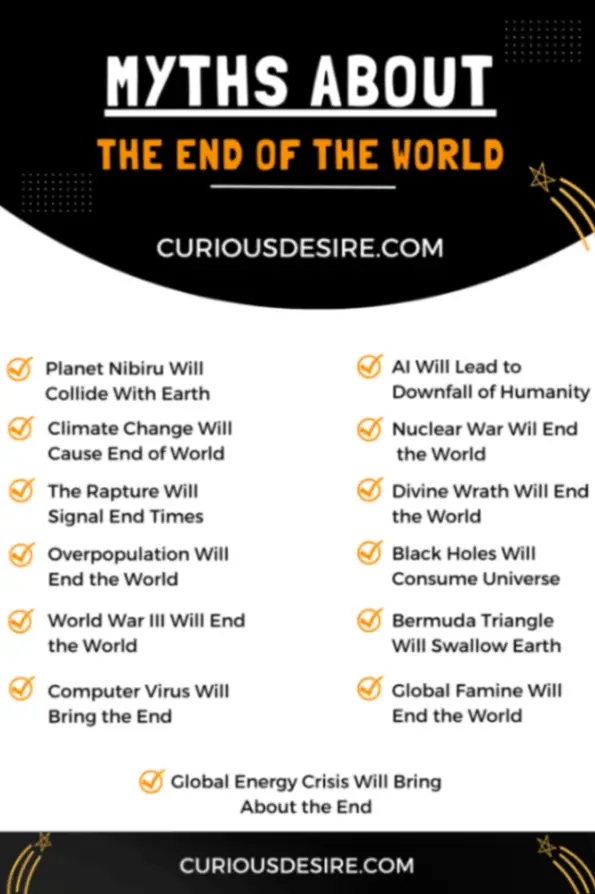Have you ever been overwhelmed by the hysteria surrounding predictions of the end of the world?
It’s easy to get caught up in the fear-mongering and speculation surrounding the end of the world, especially with the rise of social media and sensationalist news coverage
Amidst the chaos of doomsday predictions, there lies a plethora of myths and misconceptions that deserve to be debunked.
In this blog, we’ll unravel some of the most pervasive myths surrounding the end of the world.
5 most common myths about the end of the world:
- The Planet Nibiru Will Collide With Earth
- The Rapture Will Signal the End Times
- Alien Invasion Will Lead to the End of Humanity
- The End of the World Will Result from a Global Energy Crisis
- Artificial Intelligence Will Lead to the Downfall of Humanity

Myth 1: The Mayan Calendar Predicted the End of the World in 2012
The misunderstanding of the Mayan calendar stems from the fact that the Mayans used a complex system of calendars, including the Long Count calendar, which is based on cycles of time.
The Long Count calendar consists of a series of nested cycles, with the longest cycle known as a b’ak’tun, which lasts approximately 394 years. The completion of a b’ak’tun was seen as a significant event by the Mayans, but it did not signify the end of the world.
The misinterpretation of the Mayan calendar as predicting doomsday in 2012 gained traction in popular culture and media, with movies and books presenting it as a looming apocalypse.
However, scholars and experts in Mayan studies have consistently debunked these claims, emphasizing that the Mayans themselves did not view the end of the Long Count calendar as a catastrophic event but rather as a time of transition and renewal.
Myth 2: The Planet Nibiru Will Collide With Earth
The idea of a mysterious planet called Nibiru colliding with Earth originated from a misinterpretation of ancient Sumerian texts and has been perpetuated through various conspiracy theories and pseudoscientific claims.
Proponents of the Nibiru cataclysm theory often point to supposed ancient prophecies or doomsday scenarios to support their claims.
Despite the persistent belief in Nibiru, astronomers and scientists have unequivocally stated that there is no credible evidence for the existence of such a planet in our solar system.
The supposed orbit of Nibiru and its predicted collision with Earth have been thoroughly debunked through observations and calculations, demonstrating that such an event is not scientifically plausible.
Myth 3: A Global Cataclysmic Event Will Occur in 2020
Speculations and predictions about a global cataclysmic event in 2020 gained traction due to the turbulent events of the year, including the COVID-19 pandemic and other crises.
These theories often draw connections between various events, such as natural disasters, political unrest, and pandemics, and interpret them as harbingers of an impending doomsday scenario.
While it is true that the world faces significant challenges and uncertainties, attributing a specific cataclysmic event to a particular year like 2020 is not based on scientific evidence.
It is essential to differentiate between legitimate concerns about global issues and unfounded claims about a definitive end-of-the-world scenario tied to a specific timeframe.
Myth 4: The Book of Revelation Provides a Roadmap to the End of the World
The Book of Revelation, the final book of the New Testament, is a highly symbolic and allegorical text that has been subject to various interpretations throughout history.
It describes visions and prophecies attributed to the apostle John and portrays a cosmic battle between good and evil leading to the ultimate triumph of God.
Many interpretations of Revelation focus on apocalyptic themes and attempt to connect its symbolism to contemporary events as signs of the end times.
However, scholars caution against literal and overly speculative readings of the text, emphasizing its symbolic nature and its original context in addressing the persecution faced by early Christians.
Myth 5: Artificial Intelligence Will Lead to the Downfall of Humanity
The fear of artificial intelligence surpassing human capabilities and posing a threat to humanity is a prevalent theme in science fiction and popular culture.
Concerns about AI safety and the potential for autonomous machines to cause harm have led to apprehensions about the future implications of AI technology.
While it is crucial to address ethical considerations and potential risks associated with AI development, the notion that AI will inevitably lead to the downfall of humanity is a speculative and alarmist view.
AI is a tool created and controlled by humans, and its impact on society will largely depend on how it is developed and implemented.
Myth 6: Climate Change Will Cause the End of the World
Climate change is often portrayed as a harbinger of apocalyptic scenarios, with catastrophic consequences such as rising sea levels, extreme weather events, and widespread ecological collapse.
Some believe that it will inevitably lead to the end of civilization as we know it.
While climate change poses significant challenges and risks to ecosystems and human societies, the notion that it will single-handedly cause the end of the world is an oversimplification.
Climate change is a complex phenomenon driven by human activities such as deforestation, burning fossil fuels, and industrial processes. However, it is not an irreversible process and global action can mitigate its impacts and build resilience.
Addressing climate change requires collaborative efforts at local, national, and international levels, including transitioning to renewable energy sources, implementing sustainable land-use practices, and investing in climate adaptation measures.
Myth 7: Nuclear War Will Result in the End of Civilization
The specter of nuclear war has long been associated with apocalyptic scenarios, fueled by the destructive power of nuclear weapons and geopolitical tensions.
Some fear that a nuclear conflict between nations could escalate into a global catastrophe, leading to the end of civilization.
The threat of nuclear war remains a serious concern, given the proliferation of nuclear weapons and ongoing geopolitical conflicts.
However, the notion that nuclear war would inevitably result in the end of civilization overlooks the complex dynamics of international relations.
While the consequences of nuclear conflict would be devastating, humanity has thus far managed to prevent the use of nuclear weapons on a large scale through deterrence and diplomacy.

Myth 8: The Rapture Will Signal the End Times
In certain religious traditions, the concept of the rapture involves the sudden disappearance of believers, signaling the beginning of the end times and the eventual return of Jesus Christ.
This belief is often tied to interpretations of biblical prophecies and end-time scenarios.
The idea of the rapture as a literal event varies among religious denominations and interpretations of scripture.
While the concept holds significance for some believers, it remains a matter of faith rather than empirical evidence.
The belief in the rapture as a precursor to the end times reflects religious teachings and cultural narratives rather than verifiable predictions of future events.
As with other myths about the end of the world, understanding the context and complexity of religious beliefs can help dispel misconceptions and promote dialogue.
Myth 9: The End of the World Will Result from Divine Wrath
This myth is deeply rooted in various religious and cultural beliefs across civilizations.
It suggests that the end of the world will come as a punishment from a divine entity or entities, often associated with the notion of judgment day or apocalypse.
Different religions have their interpretations of how this divine wrath will manifest, whether through natural disasters, war, plagues, or other cataclysmic events.
However, it’s important to note that while these beliefs have been influential throughout history, there’s no empirical evidence to support such claims.
From a scientific standpoint, explanations for global catastrophes typically involve natural phenomena or human activities rather than divine intervention.
Myth 10: Ancient Artifacts Hold Secret Knowledge of the End Times
This myth often arises from the mystique surrounding ancient civilizations and their artifacts.
It suggests that ancient cultures possessed advanced knowledge about the end of the world, encoded within their artifacts, texts, or architectural designs.
Proponents of this myth often point to cryptic symbols or prophecies found in ancient scriptures or artifacts as evidence of this hidden knowledge.
Scholars argue that many of these interpretations are speculative and lack empirical support
While ancient civilizations certainly had sophisticated knowledge in various fields, attributing prophetic insights about the end of the world to them is largely speculative and not supported by archaeological or historical evidence.
Myth 11: The End of the World Will Result from Overpopulation
This myth suggests that unchecked population growth will eventually deplete Earth’s resources, leading to widespread famine, disease, and societal collapse.
Proponents of this belief argue that as the population continues to increase, the planet’s ability to sustain life will be overwhelmed, resulting in catastrophic consequences.
However, while overpopulation is a concern in terms of resource distribution and environmental impact, the idea that it will directly lead to the end of the world oversimplifies the complex dynamics of population growth, technological advancements, and resource management.
Many experts argue that the focus should be on sustainable development and equitable resource distribution rather than viewing overpopulation as an apocalyptic threat.
Myth 12: Black Holes Will Consume the Universe
This myth is rooted in astrophysical theories about the behavior of black holes, which are regions in space where gravitational forces are so strong that nothing, not even light, can escape from them.
While black holes do indeed exist and can exert significant gravitational influence on surrounding matter, the idea that they will eventually consume the entire universe is based on speculation rather than scientific evidence.
Current understanding suggests that black holes primarily grow by accreting matter from their surroundings rather than actively “consuming” the universe.
The expansion of the universe and other cosmic forces play significant roles in determining its fate, and the notion of black holes devouring everything is more akin to science fiction than scientific fact.
Myth 13: World War III Will Bring About the End Times
This myth reflects fears of global conflict escalating to catastrophic proportions, leading to the collapse of civilization or even human extinction.
Historically, world wars have caused immense devastation and loss of life, and the possibility of a third world war looms as a specter of potential catastrophe.
However, while the threat of global conflict and nuclear warfare remains a concern, the idea that a single war could bring about the end times oversimplifies the complexities of modern warfare.
While conflicts certainly pose significant risks, efforts to promote diplomacy, disarmament, and international cooperation aim to prevent such apocalyptic scenarios from unfolding.
Myth 14: The Bermuda Triangle Will Swallow the Earth
This myth suggests that the Bermuda Triangle, an area in the western part of the North Atlantic Ocean, is a mysterious zone where ships, planes, and even entire islands disappear without a trace.
Some believe that this region possesses supernatural or extraterrestrial powers capable of consuming the entire Earth.
However, scientific investigations have debunked many of the claims associated with the Bermuda Triangle, attributing disappearances to natural phenomena such as extreme weather conditions, human error, or navigational challenges.
There’s no evidence to support the notion that the Bermuda Triangle poses a global threat capable of swallowing the entire planet.
Myth 15: The End of the World Will Be Brought About by a Worldwide Computer Virus
This myth speculates that a highly sophisticated computer virus could infect and compromise critical systems worldwide, leading to a catastrophic collapse of civilization.
Proponents of this myth often depict scenarios where financial networks, communication systems, and infrastructure are paralyzed by a malicious software attack, plunging the world into chaos.
While cyber threats are indeed a concern in our increasingly interconnected world, the idea of a single virus causing the complete downfall of society is largely exaggerated.
Robust cybersecurity measures, redundancy in critical systems, and the expertise of cybersecurity professionals mitigate the risk of such a catastrophic event.

Myth 16: Alien Invasion Will Lead to the End of Humanity
This myth revolves around the idea that advanced extraterrestrial civilizations may invade Earth with hostile intentions, leading to the extinction of humanity.
Depictions of alien invasions in popular cultures, such as in movies and literature, have fueled this belief.
However, there’s no scientific evidence to support the existence of hostile alien civilizations or their intent to invade Earth.
While the search for extraterrestrial life is ongoing, it’s based on exploration and scientific inquiry rather than fear of invasion.
The vast distances between stars and the limitations of physics make interstellar travel extremely challenging, further reducing the likelihood of such an event.
Myth 17: The End of the World Will Result from a Global Famine
While famine is a serious concern in various parts of the world due to factors such as climate change, conflict, and economic instability, the idea that it will lead to global extinction is exaggerated.
Modern agriculture, advancements in technology, and international aid efforts have helped mitigate the impact of famines and ensure food security for much of the global population.
While localized famines can have devastating effects on communities, they are unlikely to cause the end of the world as a whole.
Myth 18: The End of the World Will Be Triggered by a Massive Solar Flare
This myth suggests that a massive solar flare, a sudden and intense burst of radiation from the Sun, could cause widespread destruction on Earth, leading to the end of civilization.
While solar flares can disrupt satellite communications, electrical grids, and other technology-dependent systems, the likelihood of a flare causing a global catastrophe is low.
Scientists closely monitor solar activity and have measures in place to mitigate the impact of solar flares on Earth’s infrastructure.
While solar flares can pose risks to astronauts and spacecraft, they are not capable of causing the destruction of life on Earth.
Myth 19: The End of the World Will Result from a Global Energy Crisis
This myth suggests that the depletion of fossil fuels and the lack of viable alternative energy sources will lead to a global energy crisis, triggering a societal collapse and ultimately bringing about the end of the world.
While concerns about finite energy resources and the environmental impact of fossil fuels are valid, the notion that they will directly cause the end of civilization is speculative.
Efforts to transition to renewable energy sources, improve energy efficiency, and develop sustainable technologies are underway to address these challenges and reduce reliance on fossil fuels.
While an energy crisis could have serious consequences for global stability and economic prosperity, it is unlikely to result in the complete end of the world.
Myth 20: The Earth’s Magnetic Poles Will Reverse, Causing Catastrophe
This myth suggests that a reversal of the Earth’s magnetic poles, where the magnetic north and south poles switch places, will lead to catastrophic consequences such as widespread destruction, climate change, and extinction events.
While the Earth’s magnetic field does undergo periodic reversals over geological timescales, the process occurs gradually over thousands of years and is not associated with catastrophic events.
Scientists have studied past magnetic pole reversals and found no evidence linking them to mass extinctions or global catastrophes.
While a magnetic pole reversal could potentially impact navigation systems and animal migration patterns, it is unlikely to cause the end of the world as portrayed in this myth.
Conclusion
The end of the world is a topic that has fascinated and terrified people for centuries.
While it’s natural to be curious about the future and contemplate the unknown, it’s important to separate fact from fiction when it comes to doomsday predictions.
By critically examining the evidence behind these myths and engaging with credible sources of information, we can dispel fears and focus on building a more resilient and hopeful future for all.
Remember, the best way to prepare for the unknown is to live in the present and work towards creating a better world for ourselves and future generations.
Myths About the End of the World FAQs
1. Are there any ancient prophecies about the end of the world?
Yes, many ancient civilizations had their prophecies about the end of the world, but none have come true so far.
2. Will a comet or asteroid collision cause the end of the world?
While asteroid collisions have occurred in the past and may happen in the future, the likelihood of one causing the end of the world is extremely low.
3. Could a pandemic wipe out humanity?
While pandemics can be devastating, modern medicine and public health measures make it unlikely that a pandemic would wipe out humanity entirely.
4. Is the Earth heading towards a magnetic pole reversal?
While magnetic pole reversals do occur, they happen gradually over thousands of years and are unlikely to cause any catastrophic events.
5. Will the Sun eventually explode and destroy the Earth?
Yes, eventually the Sun will expand into a red giant and consume the Earth, but this is not expected to happen for billions of years.
6. Will a global food shortage lead to the end of the world?
While food shortages can have serious consequences, modern agriculture and technology make it unlikely that a global food shortage would lead to the end of the world